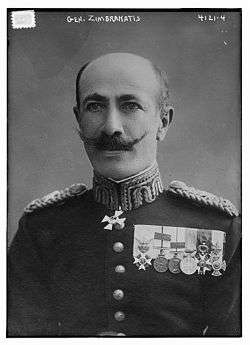Emmanouil Zymvrakakis (army general)
| Emmanouil Zymvrakakis | |
|---|---|
|
Zymvrakakis in 1916 | |
| Native name | Εμμανουήλ Ζυμβρακάκης |
| Born |
1861[1] Nafplio, Greece |
| Died |
1928 (aged 66–67) Athens, Greece |
| Allegiance |
|
| Service/branch | Hellenic Army |
| Years of service | 1878–1920 |
| Rank |
|
| Battles/wars | World War I, Occupation of Thrace |
Emmanouil Zymvrakakis (Greek: Εμμανουήλ Ζυμβρακάκης, 1861–1928) was a Greek army officer who rose to the rank of Lieutenant General, and was distinguished in World War I.
Biography
He was born to the expatriate Cretan Charalambos Zymvrakakis in Nafplio in 1861. He graduated the Hellenic Army Academy and was named 2nd Lieutenant in 1881, and went on to continue his studies at Orléans in France. In 1897, he volunteered for and fought in the Cretan Revolt. He later became an active member of the Military League, and it was he who suggested, following the Goudi coup, to call upon the Cretan Eleftherios Venizelos to come to Greece. Subsequently he served as adjutant to King George I of Greece, was appointed as CO of the newly raised 11th Infantry Division at Thessaloniki in late 1913 and raised to the rank of Major General on 8 December 1914. A close friend and supporter of Venizelos, he was instrumental in the revolt that led to the establishment of the pro-Venizelist and pro-Allied "State of National Defence" in northern Greece during World War I. He led the first Greek units on the Macedonian front, and commanded the Greek forces in the Battle of Skra-di-Legen in May 1918. Subsequently he was tasked with the occupation of Western and Eastern Thrace, territories that had been ceded to Greece from Bulgaria and the Ottoman Empire respectively. In the latter case he defeated the resistance offered by the remaining Ottoman forces in the region. Following the electoral defeat of the Venizelists in 1920, he was dismissed from his post. He died in Athens in 1928.
External links
-
 Media related to Emmanouil Zymbrakakis at Wikimedia Commons
Media related to Emmanouil Zymbrakakis at Wikimedia Commons
- ↑ Note: Greece officially adopted the Gregorian calendar on 16 February 1923 (which became 1 March). All dates prior to that, unless specifically denoted, are Old Style.
